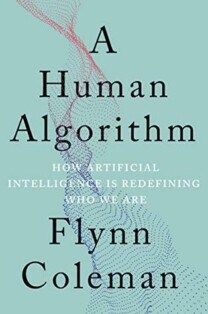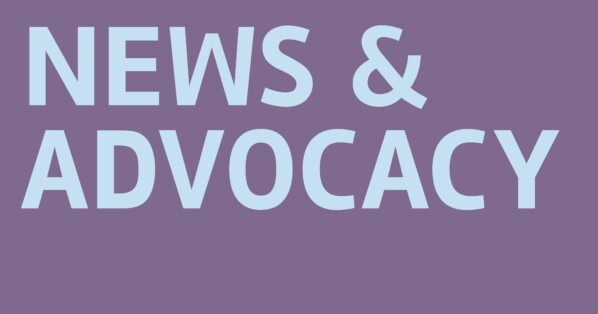 A Human Algorithm: How Artificial Intelligence Is Redefining Who We Are
A Human Algorithm: How Artificial Intelligence Is Redefining Who We Are
By Flynn Coleman, J.D.
Counterpoint Press, 2019 | ISBN-10: 1640092366 | ISBN-13: 978-1640092365
Hardcover: 336 pages
This book about artificial intelligence (AI) is both enlightening and disturbing. This is not a book about how to code machines with an algorithm for being human; rather, this book imparts information about ethics, history, humanities, and philosophy, as they relate to our future and AI.
The author, international human rights attorney Flynn Coleman, J.D., describes how algorithms, and their related dangers, such as cybercrime and personal data breaches, are already part of our lives. She then provides some history of technology, starting from the first tools developed by humans, and how technology continues evolving faster and faster. Coleman reminds us that, “We’ve had more than forty years to adapt to the Information Age. We are not going to have that much time to acclimatize to the Intelligent Machine Era.”
She defines the human algorithm as “the philosophical center of ourselves. It’s our personal and collective ethos; it’s the DNA of our humanity; it’s our conscience.” There is too much information in the book to summarize adequately in a short review, but following are highlights.
Coleman’s hope is “ … to convince you that we must acknowledge the science, face our technological fears, debate our present and future human and civil rights, and marshal the moral courage to create intelligent machines that reflect our humanity in all of its diversity.”
A key takeaway for me is the importance of having AI developed by a diverse, inclusive collection of people, with open, robust public discussion. In addition to AI technology professionals, we need to include others in the process. According to the author, “There are still far too few humanists, rights advocates, social scientists, and others with diverse (and perhaps helpfully contrarian) viewpoints involved in the discussion.” One of the things we can all do is support organizations such as SWE that are promoting diversity in the STEM fields, with an emphasis on inclusion in AI technology.
Coleman also makes a good case for acting now, because if we wait much longer, it will be too late to go back and fix what we have done. One idea presented is the need for a national strategy for approaching AI in an open, planned, and collaborative way. If we continue to develop AI in secret silos of effort, we risk developing intelligent machines that create a more hostile world, rather than a world that reflects our true humanity. The author includes this quote from Stephen Hawking, Ph.D.: “AI is likely to be the best or worst thing to happen to humanity.”
Another interesting idea proposed in the book is having something similar to the Hippocratic Oath doctors take, but for AI developers. (In a similar vein, members of the Order of the Engineer must sign the “Obligation of an Engineer.”) The International Bill of Human Rights is also mentioned, and the importance of AI that reflects those concepts.
The book covers thorny topics such as the rights of AI beings, cyberwarfare, and the potential for an AI arms race much like the Cold War — one important aspect being the dangers of autonomous weapons, including drone swarms, and the need for an international agreement on autonomous weapons.
Coleman is not alone in her concerns — I’ve heard some of them echoed in various places, including the platform of one presidential candidate. AI is often the topic of articles in IEEE publications.
The author intends the book to be “a cautious statement of hope that, in the end, technology will reveal who we are — resilient and vulnerable, curious and creative, abounding with potential for genuine connection with ourselves and with others — and that it presents an opportunity to code these traits into our future, to bend collectively toward the light. Much of the journey into the Intelligent Machine Age is still in front of us, but I am confident that in our quest to build a digital soul, we will find our own.”
I highly recommend this book, especially to those working in the AI world. There is much food for thought, and it will take all of us being aware and doing what we can to ensure AI enriches, rather than destroys, our world as we know it.
Marcie Mathis graduated from the University of Washington with a B.S. in electrical engineering. She has spent most of her engineering career as a civilian U.S. Navy employee and works at the Puget Sound Naval Shipyard and Intermediate Maintenance Facility in Bremerton, Washington. She joined SWE in 1988 as a student and serves on the multicultural committee and as a member of the editorial board.
“Media: A Human Algorithm: How Artificial Intelligence Is Redefining Who We Are” was written by Marcie Mathis, SWE Editorial Board. This article appears in the 2020 Winter issue of SWE Magazine.
Author
-
Marcie Mathis graduated from the University of Washington with a bachelor’s degree in electrical engineering. She has spent most of her engineering career as a civilian U.S. Navy employee and works at the Puget Sound Naval Shipyard and Intermediate Maintenance Facility in Bremerton, Washington. She joined SWE in 1988 as a student and serves on the multicultural committee and as a member of the editorial board.







